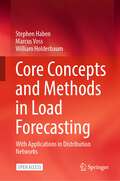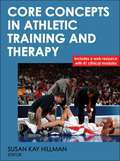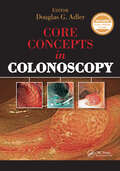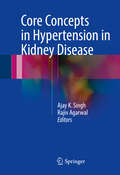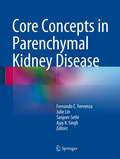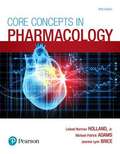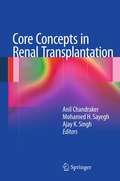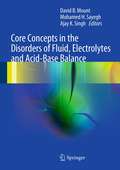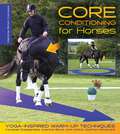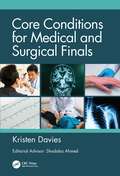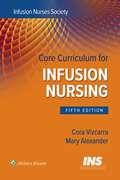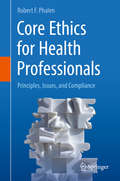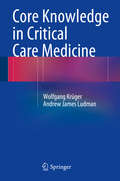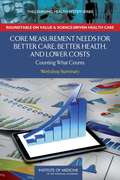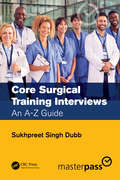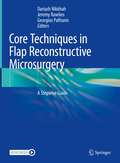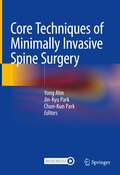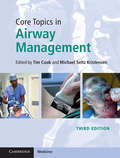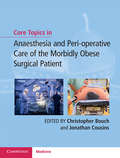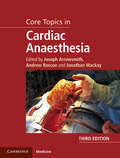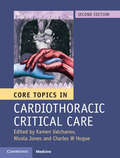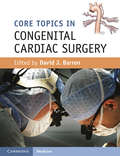- Table View
- List View
Core Concepts and Methods in Load Forecasting: With Applications in Distribution Networks
by William Holderbaum Stephen Haben Marcus VossThis comprehensive open access book enables readers to discover the essential techniques for load forecasting in electricity networks, particularly for active distribution networks.From statistical methods to deep learning and probabilistic approaches, the book covers a wide range of techniques and includes real-world applications and a worked examples using actual electricity data (including an example implemented through shared code). Advanced topics for further research are also included, as well as a detailed appendix on where to find data and additional reading. As the smart grid and low carbon economy continue to evolve, the proper development of forecasting methods is vital. This book is a must-read for students, industry professionals, and anyone interested in forecasting for smart control applications, demand-side response, energy markets, and renewable utilization.
Core Concepts in Athletic Training and Therapy
by Susan Kay HillmanCore Concepts in Athletic Training and Therapy provides a balanced introduction to the knowledge, skills, and clinical abilities that span the profession of athletic training. Students in athletic training, coaching, or other health care fields will find current information covering the breadth of theory and application of athletic training, including evidence-based practice, prevention and health promotion, clinical examination and diagnosis, acute and emergency care, therapeutic interventions, and health care administration. It also presents advanced topics of pathophysiology and psychological response to sport injury to better prepare students for continued study. Compared to other introductory athletic training texts, Core Concepts in Athletic Training and Therapy is the only text that aligns with the newest athletic training education competencies from the National Athletic Trainers' Association (2011). Written by a team of respected athletic training educators with experience at the professional and collegiate levels, the text breaks new ground by condensing key concepts to a comprehensive level while not overwhelming students with content that will be addressed in depth in advanced courses. Numerous features assist students in learning the fundamentals: - Each of the six parts opens with a discussion of the competencies that are covered in that part and concludes with a reference list of those competencies by description and number, making it easy to monitor the knowledge required. - A companion web resource contains 41 clinical proficiency exercises, carefully chosen to complement the introductory level of the text and align with required educational objectives. The modules may be completed online or printed, and cross-references at the end of each chapter guide students to the appropriate modules to apply the chapter content. - Case studies sprinkled throughout the text demonstrate real-world situations and include critical thinking questions that underscore principles of rehabilitation and exercise. - Full-color photographs depict specific conditions and techniques, giving students an accurate picture of real practice. - For instructors, a complete set of ancillaries assists in preparing and presenting lectures, leading class discussion, and planning assignments and assessments. In addition, Core Concepts in Athletic Training and Therapy is the first text to offer a complete chapter on evidence-based practice, the newest educational competency required of entry-level athletic trainers by the NATA. The rest of the text introduces general information about life as an athletic trainer, such as training, education, licensure, certification, employment opportunities, and the roles in a sports medicine team. The core of the text then focuses on required knowledge and skills related to injury prevention, injury recognition and classification (including region-specific examination strategies, basic objective tests, physical exam strategies, and injury mechanisms), acute care, therapeutic interventions, and the role of pharmaceuticals in the healing process. To round out the text, it addresses health care administration and discusses strategies for the management of athletic training programs. With learning features and a web resource that integrate clinical learning into an introductory course, Core Concepts in Athletic Training and Therapy is the essential resource for current and future athletic trainers. Long after its first use, it will prove a valuable reference for athletic training students as they progress through the curriculum, prepare for certificiation, and begin careers in the profession. Core Concepts in Athletic Training and Therapy is part of Human Kinetics' Athletic Training Education Series. Featuring the work of respected authorities in athletic training, this collection of outstanding te
Core Concepts in Colonoscopy
by Douglas AdlerCore Concepts in Colonoscopy covers all aspects of diagnostic and therapeutic colonoscopy, emphasizing overarching concepts that gastroenterology fellows and physicians must know to achieve success in both the technical and cognitive aspects of the procedure. In this comprehensive resource, Dr. Douglas G. Adler and his contributors provides a straightforward and practical review of colonoscopy.Core Concepts in Colonoscopy aims to address and convey the core concepts of colonoscopy: from the structure and function of the colonoscope itself, to insertion techniques, loop formation and reduction, polypectomy techniques for any situation, the avoidance and management of perforations and other adverse events, as well as advanced techniques including (but not limited to) endoscopic mucosal resection and colonic stenting.Each chapter inside Core Concepts in Colonoscopy is lavishly illustrated with multiple key images to accentuate and enhance the written text, as well as a plethora of tips, tricks, and accumulated points of wisdom in each chapter on all facets of colonoscopy.Additional Website Component!Core Concepts in Colonoscopy is accompanied by a video website with specific videos connected to individual chapters that will illustrate basic and advanced colonoscopic techniques from many leading experts and will further enhance the learning process. The addition of the video website allows for a more robust learning experience and allows the reader to watch, listen, view repeatedly, and reinforces the techniques presented in the written text.GI fellows, junior gastroenterologists, and even advanced physicians will appreciate Core Concepts in Colonoscopy because of the user-friendly and efficient structure that allows for the material to be quickly read, as well as easily absorb the wealth of key practical knowledge found inside.
Core Concepts in Hypertension in Kidney Disease
by Ajay K. Singh Rajiv AgarwalThis guide provides a comprehensive review of the full spectrum of hypertension in chronic kidney disease (CKD). Targeted towards the busy practitioner, the focus of this volume is on various therapies and how to lower blood pressure through lifestyle changes. Specialist patient populations and hypertension and causes of hypertension are also covered in detail. Clinically-focused and authoritative, this resource offers a rationalized approach to diagnosing and treating hypertension in CKD.
Core Concepts in Parenchymal Kidney Disease
by Ajay K. Singh Fernando C. Fervenza Julie Lin Sanjeev SethiCore Concepts in Parenchymal Kidney Disease provides comprehensive and state-of-the-art information on the diagnosis, treatment, classification and pathogenesis of glomerular and tubulointerstitial diseases. Chapters feature various clinical scenarios and are authored by a team of renowned experts in the field. Experienced clinicians and trainees alike will find this authoritative reference to be a valuable resource and contribution to the literature.
Core Concepts in Pharmacology, 5th Edition
by Leland Norman Holland Michael Patrick Adams Jeanine BriceAn interdisciplinary exploration of pharmacology. <P><P>By its very nature, pharmacology is a challenging interdisciplinary subject that requires understanding concepts from a wide variety of the natural and applied sciences to predict drug action. For this reason, authors Holland, Adams, and Brice have organized Core Concepts in Pharmacology according to body systems and diseases, placing drugs in the context of their therapeutic use. This gives students easier access to the prerequisite anatomy, physiology, pathophysiology, and pharmacology organized in the same chapter where the drugs are discussed. <P><P>The Fifth Edition continues its prototype approach of introducing, in detail, the one or two most representative drugs in each class. It also maintains a strong emphasis on safe, effective nursing care with a new chapter on preventing medication errors, features new Drug Focus boxes to cover emerging drugs, and includes many more new and updated features.
Core Concepts in Renal Transplantation
by Anil Chandraker Mohamed H. Sayegh Ajay K. SinghThough kidney transplantation is considered a routine procedure, there are still significant challenges in post-transplant management. Core Concepts in Renal Transplantation is a clinically focused authoritative guide to the management of kidney transplantation. This comprehensive, state-of-the-art reference summarizes the recent changes in the field of transplantation, offering the complete range of up-to-date information on all the various aspects of basic immunobiology and the medical care of the transplant recipient. Written by a team of renowned authorities in renal transplantation, this concise resource is intended for both the nephrologist and the non-specialist with an interest in kidney transplantation.
Core Concepts in the Disorders of Fluid, Electrolytes and Acid-Base Balance
by Mohamed H. Sayegh Ajay K. Singh David MountFluid, electrolyte, and acid-base disorders are central to the day-to-day practice of almost all areas of patient-centered medicine - both medical and surgical. Virtually every aspect of these disorders has experienced major developments in recent years. Core Concepts in the Disorders of Fluid, Electrolytes and Acid-Base Balance encompasses these new findings in comprehensive reviews of both pathophysiology and clinical management. In addition, this volume offers clinical examples providing step-by-step analysis of the pathophysiology, differential diagnosis, and management of selected clinical problems. Written by leading experts in fluid, electrolyte, and acid-base disorders, this reference is an invaluable resource for both the nephrologist and the non-specialist physician, or medical trainee.
Core Conditioning for Horses
by Simon CocozzaEvery equestrian wants to know: what is the difference between the horse that &“dances&” when you are on him, and the one that doesn&’t? According to Visconte Simon Cocozza, Trainer and Examiner for the La Fédération Française d'Equitation (FFE), it all comes down to the horse&’s posture. The horse&’s ability to use the powerful mechanisms already built into his body reliesnotupon the strength we can see on the outside but the strength on theinside. This invisible and complex arrangement of internal &“core&” muscles control the horse&’s posture, suppleness, and agility. Their good condition is the key to the dance.Equine core muscles are very difficult to isolate with the traditional training techniques common to horse sports. However, by examining what we do with thehumanbody when faced with a weak core, we can find new methods for conditioning these areas of the equine body. Visconte Cocozza has taken principles of the human practice of yoga and used them to develop novel ways of reaching deep within the horse&’s body and gently &“unlock&” areas that may be a little &“rusty,&” improve core fitness, and even relieve pain related to conditions such as kissing spine. In this book, he provides step-by-step instruction explaining easy mounted exercises that enhance the horse&’s posture, and boost his confidence in his body and movement, making him easier to ride, and ultimately, the dance partner you&’ve always imagined.
Core Conditions for Medical and Surgical Finals
by Kristen DaviesThis concise and accessible revision guide delivers the must-know facts and associations for the common conditions that are most likely to be tested during medical school finals across medicine and surgery. Covering 60 common presentations, ordered by specialty, information is systematically structured throughout and is ideal for rapid reference. Each condition is represented by a succinct review covering definition, epidemiology, aetiology, pathology, clinical presentation, examination, investigations, differential diagnosis and management. Mnemonics, illustrations, boxes and summary tables supplement the text throughout. Key Features One-stop shop for finals revision covering 60 common conditions requiring medical or surgical management Presents core facts in accessible, ‘bite-sized’ sections to aid memory and rapid recall Highly structured format for ease of reference Incorporates the latest clinical guidelines, handy hints and tips, mnemonics and questions for self-assessment ------------------------------------------------------------------------------------------------------- Written by a foundation doctor who understands from recent personal experience the requirements and pressures of medical finals, this aide-memoire will provide invaluable guidance during clinical studies and examination preparation. About the Author: Kristen Davies, MBChB (Honours) MRes (Distinction), is an Academic Foundation Doctor, Northumbria Healthcare NHS Foundation Trust and a Training Fellow, Newcastle University, UK. Editorial Advisor: Shadaba Ahmed, FRCS-ORL/NHS DLO MoME MCPS FCPS is ENT, is Consultant and Lead for HN Services, University Hospitals of Morecombe Bay NHS Foundation Trust, an Honorary Lecturer at Lancaster University and an Honorary Teacher at Liverpool University, UK.
Core Curriculum for Infusion Nursing: An Official Publication of the Infusion Nurses Society
by Mary Alexander Infusion Nurses SocietyAn official publication of the Infusion Nurses Society, Core Curriculum for Infusion Nursing, 5th Edition, provides comprehensive preparation for the Certified Registered Nurse Infusion (CRNI®) exam from the global authority on infusion nursing and helps you deliver optimal care in any practice setting. The convenient outline format streamlines review and ensures fast access to essential information across the core content areas of Technology and Clinical Application; Fluid and Electrolyte Balance; Pharmacology, Infection Prevention and Control; and Transfusion Therapy, Antineoplastic Biologic Therapy, and Parenteral Nutrition.
Core Ethics for Health Professionals: Principles, Issues, and Compliance
by Robert F. PhalenA timely overview of ethics, emphasizing applications to biomedical researchers, health providers, and administrators There are no simple rules to guide ethical conduct in daily practice, health professionals must have a basic understanding of several topics including ethical theories; ethical scandals; laws, regulations, and institutional policies; and public perceptions. This book can be used for self-study, for classroom instruction, and as a refresher and update by practicing health professionals. The chapters have learning objectives, focused content, a summary of important points, a quiz, and a list of key references. Although the book is arranged in a logical order, each chapter may be studied independently.
Core Knowledge in Critical Care Medicine
by Wolfgang Krüger Andrew James LudmanThis book provides a detailed review of state of the art knowledge on critical care topics as well as the latest research findings. It covers the core aspects in excellent detail, but is not so comprehensive as to make its daily use unfeasible. For each condition considered, discussion of the pathophysiology is integrated with observations on diagnosis and treatment in order to allow a deeper understanding. The book is scientifically based, with extensive references to published research. This will allow readers to investigate their individual interests further and will enable physicians to justify measures by providing a coherent, evidence-based strategy and relevant citations where needed. Core Knowledge in Critical Care Medicine will appeal to experienced practitioners as an aide-mémoire, but will also be of great value to a wide range of more junior staff wishing to complement their background knowledge with important facts applicable to everyday practice.
Core Measurement Needs for Better Care, Better Health, and Lower Costs
by Institute of Medicine Robert Saunders Joe Alper Julia Sanders Roundtable on Value & Science-Driven Health CareHealth care quality and its affordability have become very pressing issues in the United States. All sectors of the country are attempting to push forward initiatives that will improve the health care system as well as the health of the American population in general. Despite the economical dedication to health care, about 1/5, the system remains uneven and fragmented, patient harm is quite common, care is often uncoordinated, and many more mishaps occur. There exists many obstacles to improve the nation's health care system; these include the capacity to reliably and consistently measure progress. In 2006 the Institute of Medicine (IOM) established the Roundtable on Value & Science-Driven Health Care which has since accelerated the development of a learning health system- one in which science, informatics, incentives, and culture are aligned to create a continuous learning loop. This learning loop would thus help make the health care system better. In response, the IOM organized a 2-day workshop to explore in depth the core measurement needs for population health, health care quality, and health care costs. The workshop hoped to gain a full understanding of how to improve the nation's measurement capacity to track progress in the health care system. Having this knowledge would help the nation get one step closer to the creation of an efficient learning loop. The workshop was divided into a series of sessions that focused on different aspects of measurement. Core Measurement Needs for Better Care, Better Health, and Lower Costs: Counting What Counts: Workshop Summary includes explanations and key details for these sessions: Vision, Current Measurement Capabilities, Specifying the Shape of a Core Metric Set, and Implementation. The report also features common themes within these areas, the workshop agenda, and information about those involved.
Core Radiology
by Jacob MandellCombining over 1200 clinical images, 300 color illustrations and concise, bulleted text, Core Radiology is a comprehensive, up-to-date resource for learning, reference and board review. The clearly-formatted design integrates the images and accompanying text, facilitating streamlined and efficient learning. All subjects covered by the American Board of Radiology Core Exam are included: - Breast imaging, including interventions and MRI - Neuroimaging, including brain, head and neck, and spine - Musculoskeletal imaging, including knee and shoulder MRI - Genitourinary imaging, including pelvic MRI - Gastrointestinal imaging, including MRI and MRCP - General, vascular, gynecological and obstetrical ultrasound - Nuclear imaging, including PET-CT and nuclear cardiology - Thoracic imaging - Cardiovascular imaging, including cardiac CT and MRI - Pediatric imaging - Interventional radiology - Radiological physics review, contrast media and reactions. Essential reading for radiology residents reviewing for boards, as well as practicing radiologists seeking a practical up-to-date guide to the field.
Core Surgical Training Interviews: An A-Z Guide
by Sukhpreet Singh DubbEach year the competition ratio for UK Core Surgical Training jobs is high.. For every 3.3 applicants, only one will be successfully appointed to a CST post. This revision guide maximises the chances of interview success. by providing comprehensive application and interview advice. Chapters include Clinical, Portfolio and Management stations and include both advice and real clinical scenarios, enabling trainee surgeons to save time and gain interview confidence.
Core Techniques in Flap Reconstructive Microsurgery: A Stepwise Guide
by Dariush Nikkhah Jeremy Rawlins Georgios PafitanisThis book provides a practical, step-by-step guidance on modern workhorse flaps for plastic and reconstructive surgeons in training or in their early career. The 50 chapters cover everything from surgical fundamentals to preconditions of microsurgical techniques, but also covers pre-operative planning, steps of microsurgical dissection and management of complications in a straightforward, explanatory style, and are supplemented by over 600 clinical illustrations and cadaveric images. Further videos demonstrations with pertinent steps in flap dissection, anatomical nomenclature and long-term outcomes are also demonstrated. For each flap a detailed discussion of key papers concerning its origin, pitfalls, technical refinements and tips for success are also included. Thanks to specific notes on common reconstructive challenges and complications, this book offers a valuable reference tool and would be unquestionably an integral reference guide for every surgeon interested in reconstructive microsurgical techniques, especially during their early microsurgical career.
Core Techniques of Minimally Invasive Spine Surgery
by Yong Ahn Jin-Kyu Park Chun-Kun ParkThis book issues all aspects of minimally invasive spine surgery. From interventional techniques such as nerve block to multilevel fusion surgery, the field of minimally invasive surgery is organized by chapter from basics to the end. Each chapter will include various figures and tables, and videos will be added in the surgery-related parts. A special focus will be placed on spinal endoscopic surgery, which has undergone rapid development in recent years. Both full-endoscopic spine surgery and uni-portal bilateral endoscopic will be dealt. Various surgical approaches and procedures will be presented for disc-herniated disease and stenotic legion from cervical to lumbar. The new technology solution such as navigation-guided spine surgery and robot surgery and artificial and augmented reality will be introduced.
Core Topics in Airway Management
by Ian Calder Adrian PearceUK anesthetists Calder and Pearce bring together 32 chapters that detail how trainees, anesthetists, intensivists, emergency physicians, and others involved in airway procedures can manage challenges in a variety of patients and clinical settings. Anesthetists from Europe and South Africa first address anatomy, physiology, airway reflexes, and equipment, then discuss basic principles and topics like sleep apnea and anesthesia, intubation, airway damage, extubation, and the aspiration problem. Ethical and legal issues and specialties like obstetrics, pediatrics, bariatrics, dental anesthesia, the ICU, and ear, nose, and throat surgery are then covered. This edition has been updated to include new procedures and equipment, test questions and answers, and new chapters, including one on solutions to problems when resources are scarce. Annotation ©2011 Book News, Inc. , Portland, OR (booknews. com)
Core Topics in Airway Management
by Tim Cook Michael S. KristensenManagement of the airway is an important and challenging aspect of many clinicians' work and is a source of complications and litigation. The new edition of this popular book remains a clear, practical and highly-illustrated guide to all necessary aspects of airway management. The book has been updated throughout, to cover all changes to best practice and clinical management and provides extensive coverage of the key skills and knowledge required to manage airways in a wide variety of patients and clinical settings. The best of the previous editions has been preserved, whilst new chapters on videolaryngoscopy, awake tracheal intubation, lung separation, airway ultrasonography, airway management in an epidemic and many more have been added. This is an essential text for anyone who manages the airway including trainees and specialists in anaesthesia, emergency medicine, intensive care medicine, prehospital medicine as well as nurses and other healthcare professionals.
Core Topics in Anaesthesia and Perioperative Care of the Morbidly Obese Surgical Patient
by Christopher Bouch Jonathan CousinsAn essential read for healthcare providers across all disciplines, this book is a comprehensive guide to the perioperative management of the obese patient. Providing practical guidance on specific aspects of physiology, pharmacology and anaesthetic technique, it addresses the increasing prevalence of obese patients in both elective and emergency settings and the need for a definitive text on the perioperative care for these patients. With content mapped to the Royal College of Anaesthetists learning matrices, the book covers key topics such as: • Epidemiology of obesity • Pathophysiology of obesity • Pre-operative assessment • Intra- operative management • Post-operative care • Bariatric surgery.
Core Topics in Cardiac Anaesthesia
by Joseph Arrowsmith Andrew Roscoe Jonathan MackayThis fully-updated third edition provides a practical and concise guide to all aspects of the perioperative care of cardiac surgical patients. Produced by recognised leaders from world-renowned cardiac centres, this is the authoritative text for residents and fellows in anaesthesia and cardiac surgery, clinical perfusionists, and critical care nurses. Updated chapters include regional anesthesia, paediatric cardiac anaesthesia, and anaesthesia for specific procedures such as aortic valve surgery and cardiac transplantation. An entire section is dedicated to transoesophageal echocardiography (TOE) in recognition of the increasing demand for basic TOE training. The book also includes an expanded chapter on the applications and anaesthetic implications of extracorporeal membrane oxygenation (ECMO). The text focuses on clinical practice and the basic science and pharmacology underpinning cardiac anaesthesia, ensuring the reader can easily apply the knowledge gained to real-life situations.
Core Topics in Cardiothoracic Critical Care
by Kamen Valchanov Nicola Jones Charles W. HogueMost patients with critical cardiac or thoracic conditions will at some stage pass through the cardiothoracic critical care unit. Critical care presents more complex clinical data than any other area of medicine. The new edition of Core Topics in Cardiothoracic Critical Care focuses on the latest practise in the management of patients in cardiothoracic intensive care. The practice of cardiothoracic critical care medicine is constantly evolving, and this new edition reflects the modernized learning styles for trainees. Each chapter includes key learning points as well as sample multiple choice questions and answers to assist in exam preparation. This edition also features updated chapters on ECMO, perioperative management of patients undergoing emergency cardiothoracic surgery, and advanced modes of organ support for patients. This text provides key knowledge in a concise and accessible manner for trainees, clinicians and consultants from specialities and disciplines such as cardiology and anaesthesia, and nursing and physiotherapy.
Core Topics in Congenital Cardiac Surgery
by David J. BarronFeaturing a combination of easily digestible sections, clinical images, and a text layout that assists rapid fact acquisition, this book highlights the core topics in congenital cardiac surgery. <P><P>The text covers all the commonly encountered anomalies, with simple explanations of the underlying anatomy and management options. Readers are provided with strong support from the outset; including guidance on diagnosis, operative technique, and post-operative management. Aimed at trainees preparing for professional examination and newly appointed consultants, this invaluable handbook is a go-to resource for the busy practitioner. It will also be an ideal reference for cardiologists, intensivists, perfusionists, and cardiac nurses, requiring a concise and accessible summary of the surgical aspects of diagnosis and treatment. The book includes sections on transplantation, ECMO, hybrid procedures and adult congenital heart disease.<P> Contains short, easy-to-digest chapters, for rapid reference by busy practitioners.<P> Reviews key procedures and the latest operative techniques.<P> Includes clinical images that facilitate diagnosis and management.
Core Topics in Critical Care Medicine
by Fang Gao Smith Joyce Yeung Joyce YeungCritical care is a specialty that treats seriously ill patients with a diverse range of diseases and/or injuries affecting every organ system. The critical care unit can initially be a daunting environment, with complex monitoring equipment and large volumes of clinical data to be interpreted.
